

SAME STORY
Despite all of the changes around LSU football, many of the same issues cropped up against Alabama.





DROWNING
Errors pile up at Alabama for LSU’s
BY CHLOE RICHMOND Sports Editor
When LSU football won the coin toss for the first time after losing 12 in a row, it felt like a sign that would set the tone for the rest of the game.
Unfortunately for the Tigers, that would be the only win they’d leave Bryant-Denny Stadium with. LSU’s trip to Tuscaloosa ended with a 20-9 loss to Alabama.
What did set the tone for the game was the Tigers’ opening drive.
LSU deferred to the second half, and although Alabama’s opening drive amounted to nothing, it still consisted of eight plays and made its way into LSU territory.
As for the Tigers, it got ugly fast with a false start on the first play that put LSU back at 1st-and-15. The uncharacteristic fumble by freshman Harlem Berry that followed was enough to make a Tiger fan’s teeth chatter, but the drive didn’t end there, and neither did the disappointment.
LSU made its way down to the Alabama 13-yard line and sent senior Damian Ramos out for a field goal attempt. Before the game, Ramos was 14 for 17 and made every field goal attempt under 40 yards this season.
Until Saturday night.
It was textbook. The snap was good, the hold was in place, but Ramos just whiffed the 30-yard attempt left. What would’ve been LSU on the board first turned into a missed opportunity that just couldn’t happen against the fourth-ranked team in the country.
From then on, the mistakes continued to pile up for LSU. Five false starts highlighted the penalties, but the five other penalties can’t not be mentioned. From pass interference
third straight loss
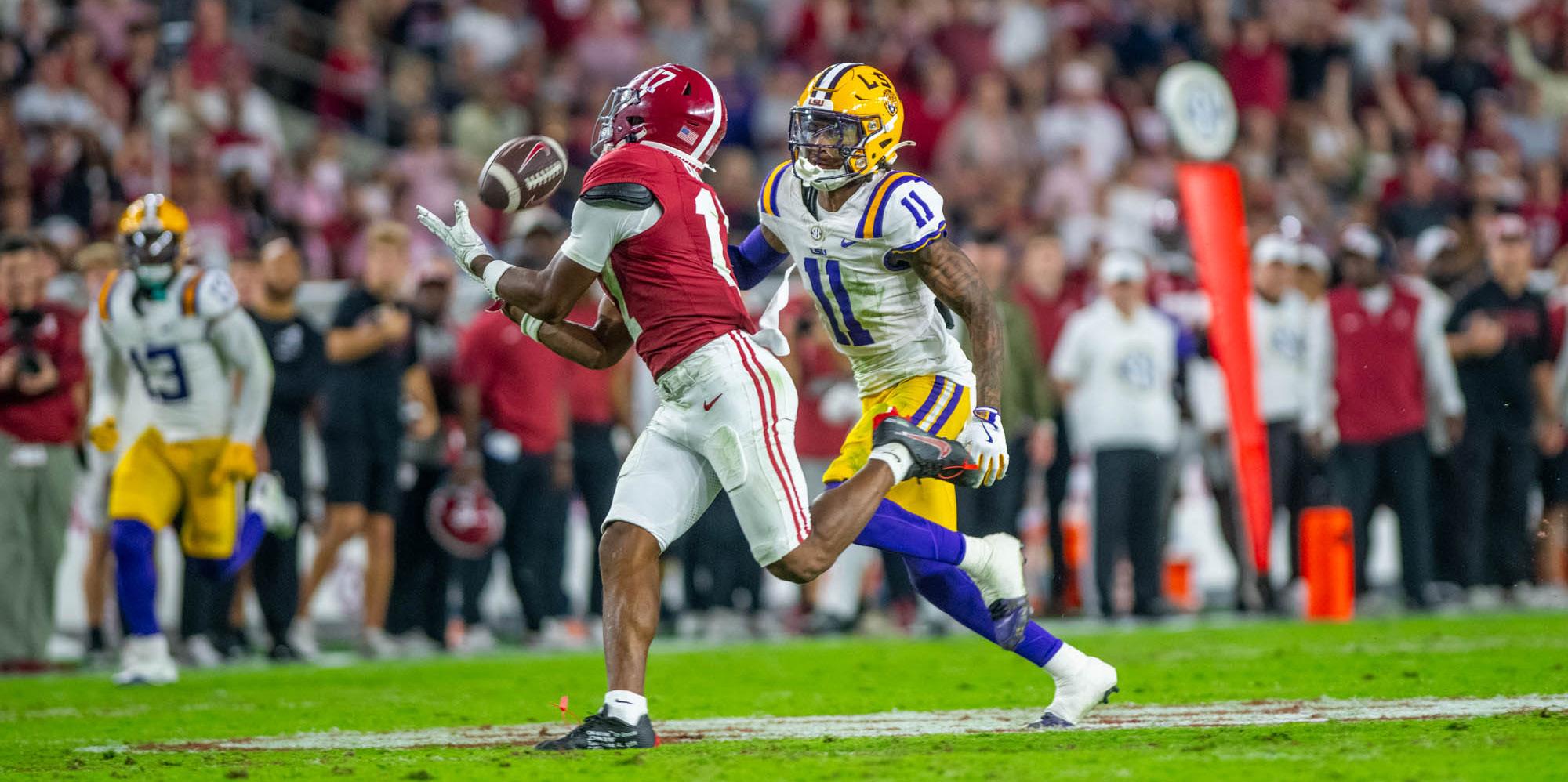
and offsides to holding and delay of game, it wasn’t a pretty sight. In comparison, Alabama only had two penalties and the first wasn’t called until the third quarter.
Has LSU really been this penalty-prone the entire season? Well, the Tigers entered the game averaging 56.4 yards per game lost to penalties — they outdid that number against the Tide with 74 yards.
“I’m disappointed that they were called, but not disappointed with our aggression,” LSU interim head coach Frank Wilson said.
It was error after error, which made it feel like LSU was playing catch-up the whole time.
For Alabama, it was making strides and wasn’t looking back.
This, of course, was because of a struggling LSU offense that couldn’t keep up with its strong defense.
On paper, fifth-year senior quarterback Garrett Nussmeier was doing well with an 86% completion rate, but it was the scant 121 yards that raised con-

cern. Alabama’s redshirt junior quarterback Ty Simpson, despite a 60% completion rate, cleared Nussmeier with true offensive leadership.
Simpson may have been off here and there, but what set him apart was his consistent decision making to throw the ball long downfield. He was only 21 for 35, but his 277 yards of offense, including a touchdown, drove Alabama to the win.
Alabama’s offense stayed creative and made LSU’s defense look scattered and lost, continuously leaving crimson receivers wide open. Simpson’s highlight reel throws were 53-, 33- and 32-yard passes. Nussmeier’s longest ball of the night was a 20yard throw to Zavion Thomas in the third quarter, and by that point Alabama had already run off to a 17-3 lead.
“I thought he started the game off extremely well,” Wilson said. “As we went into the depth of the game, we just thought it was an opportunity for us to change it, to throw their defense off. And so we went with the change necessary.”
Nussmeier was benched in the second half and Mississippi State transfer Michael Van Buren Jr. tried to clean up the mess. Van Buren was 5 for 11 and coughed up 52 yards in crunch time, but the Tide was too strong. He was sacked twice, and that alone says all that needs to be said about LSU offense’s second half performance.
To add on to the weak yet characteristic performance on the offense, LSU, once again, couldn’t run the ball effectively. Alabama didn’t do much better, finishing with 56 yards to LSU’s 59, but Nussmeier’s negative at the 13 yards stick out like a sore thumb. Berry led the run with 66 yards on 12 attempts.
The bright spot in LSU’s second half performance was, to
no surprise, the typically consistent defense. Harold Perkins Jr. filled the stat sheet with five solo tackles, a sack, QB hurry, forced fumble and tackle for loss. He also recovered a fumble in the beginning of the fourth quarter, but it was no use for an LSU team that was only scoring off-field goals.
Tiger fans were hopeful for a rebrand of LSU football, and the thought was there. What was there to lose after undergoing a complete shift in leadership?

ERIN BARKER / The Reveille LSU football fifth-year senior quarterback Garrett Nussmeier (18) walks with his head down Nov. 8 before LSU’s 20-9 loss to Alabama at Bryant-Denny Stadium in Tuscaloosa, Al.
With an interim head coach and someone new calling the offensive shots, this game was a chance for LSU to show it had the pieces and could make it work.
Alas, the Tigers still played like a 5-3 team and finished the night 5-4, as many expected.
LSU returns to Tiger Stadium next week to face Arkansas in the Battle for the Boot, which will likely be the only trophy LSU has a shot at this year.
The Reveille holds accuracy and objectivity at the highest priority and wants to reassure its readers the reporting and content of the paper meets these standards. This space is reserved to recognize and correct any mistakes that may have been printed in The Daily Reveille. If you would like something corrected or clarified, please contact the editor at (225) 578-4811 or email editor@lsu.edu.
The Reveille is written, edited and produced solely by students of Louisiana State University. The Reveille is an independent entity of the Office of Student Media within the Manship School of Mass Communication. A single issue of The Reveille is free from multiple sites on campus and about 25 sites off campus. To obtain additional copies, please visit the Office of Student Media in B-39 Hodges Hall or email studentmedia@ lsu.edu. The Reveille is published biweekly during the fall, spring and summer semesters, except during holidays and final exams. The Reveille is funded through LSU students’ payments of the Student Media fee.
ALEXIS PERSICKE / The Reveille
LSU football sophomore cornerback PJ Woodland (11) watches the opponent catch the ball Nov. 8 during the 20-9 loss to Alabama at Bryant-Denny Stadium in Tuscaloosa, Al.
ALEXIS PERSICKE / The Reveille LSU football redshirt junior wide receiver Aaron Anderson (1) reaches for a fumble Nov. 8 during the 20-9 loss to Alabama at Bryant-Denny Stadium in Tuscaloosa, Al.
NEWS
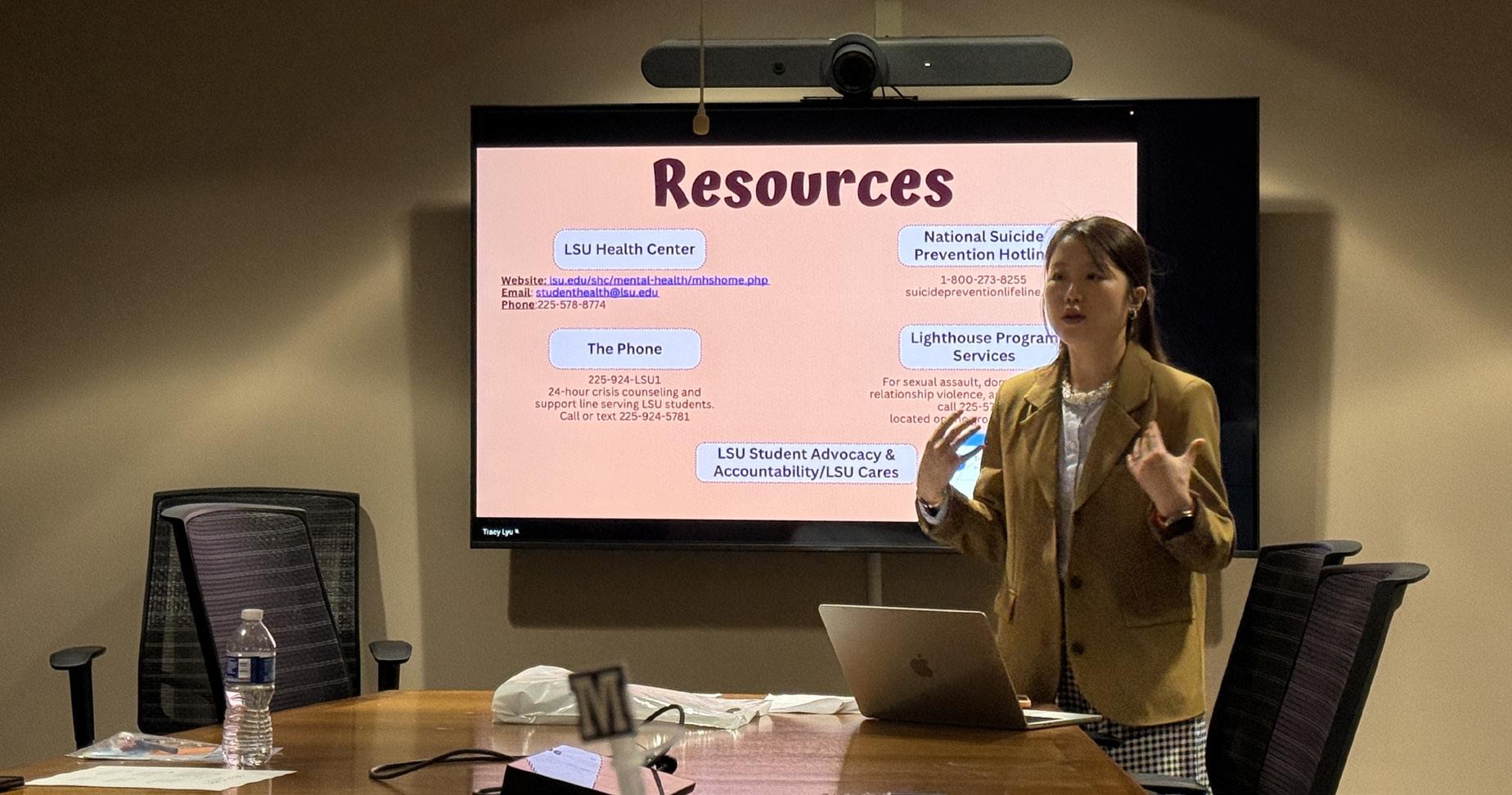
FIRST GENS
Celebratory week offers support and resources
BY KALEY MELANCON
Staff Writer
LSU put its first generation students at the forefront during FirstGen Celebration Week with events that provided support and resources for them.
The week had over 15 events focused on networking, self-care, budgeting and giving advice to help first generation students.
“It’s about showing that they’re not alone and that we’re here to help them,” said Erwin Torres, a member of LSU’s FirstGen Forward Network Committee.
Committee members hosted events along with different organizations and departments on campus. The Olinde Career Center, the Alumni Association, LSU Libraries and the Center of Academic Success were just a few of those involved.
The week kicked off with a networking workshop on Monday and information sessions on budgeting and building resumes on Tuesday.
On Wednesday, students met for donuts, coffee and wellness advice. In a small conference room, third-year graduate student
Tracy Lyu led a presentation on self care and how to reduce stress.
It started with guided meditation — closed eyes, deep breaths in and audible exhales. She posed questions about what students were grateful for and what their deepest desire was.
After everyone opened their eyes, Lyu talked about stress and how it can lead to issues like burnout. She said first generation students can deal with high expectations from parents that increase stress.
For Maddie Woodson, her stress was more timely than ever.
She said she was taking the LSAT later that day and needed to recenter herself beforehand.
Woodson was stressed last time she took the exam, and it ended up negatively affecting her score. She said she found the meditation eased her turmoil and prepared her for the day.
Woodson, an environmental management systems senior, said being a first generation student at LSU was difficult. But she found it got better over time.
“It’s hard to talk to your friends about something they don’t understand,” Woodson said.
This is why Lyu offered coping strategies to use in future stressful moments. One involved grounding themselves through senses. Another involved giving students a self care checklist with suggestions like getting a full night’s sleep, drinking more water, reading a book and expressing gratitude.
The FirstGen Forward Network Committee started the celebration in 2023 with only one day and expanded into a full week last year. A little over a third of LSU students are first generation, which Torres said is slightly above the national average.
Torres said first generation students often feel like they are the only ones experiencing these struggles, but these spaces allow them to share that experience with others. Other students, Torres said, do not realize they are first generation until they get to college.
“I always tell people to consider it your superpower,” Torres said. Giving students superpowers
Student scientists work to preserve ecosystems
BY EMILY BRACHER Staff Writer
Louisiana boasts over three million acres of coastal wetlands, both fresh and saltwater. At LSU, a group of students are dedicated to preserving this ecosystem.
LSU’s student chapter of the Society of Wetland Scientists is dedicated to wetland exploration, research and conservation. LSU started the first student-led SWS chapter in the country.
Allen Barchak, the outreach coordinator for SWS and junior coastal environmental science major, tries to spend as much time as possible working with and in the state’s wetlands. When he is not working as a KLSU DJ, Barchak also assists in research for the Tracy Quirk Wetland Plant Ecology Lab and Kevin Xu’s sediment dynamics lab.
“Our major goal is just to spread the message that wetlands are a valuable ecosystem to preserve in Louisiana and the world,” Barchak said.
SWS focuses on advocacy work and offers opportunities for members to participate in field trips, outreach events and group activities to learn more about Louisiana’s natural, coastal landscape. When the group is not out in the
field, it’s practicing writing resumes, learning from guest speakers and preparing for the professional field.
Barchak said that much of its focus is on agriculture and is partnered with LSU Ag. During homecoming week it participated by painting hail bays.
“We’re constantly attending these meetings, remembering what we’re fighting for, what we are learning and why we love it,” Barchak said.
Third-year coastal and environmental law student Taylor Horton said that there is something for everyone in SWS, especially if they love to get out into the field.
Some of the hands-on work they do includes working with the Coalition to Restore Coastal Louisiana, a non-profit organization focused on developing leaders to protect and restore the state’s coast. They also work with Glass Half Full, a recycling center in New Orleans that collects glass, breaks it down into sand and uses it to restore eroded coastlines.
With the abundance of opportunities, Horton said the organization allows students to get a feel for what they might want to pursue in the future.
Campus Society of Black Engineers holds potluck
BY JORJA ETHRIDGE Staff Writer
The National Society of Black Engineers at LSU hosted a potluck for its members and international students on Friday in the Global Community Center.
NSBE student senator and international zone chair Habeeb Falade is an electrical engineering senior and an international
student from Nigeria. Falade said he organized the potluck to foster a sense of community among international students around Thanksgiving.
The NSBE encouraged students to bring cultural dishes. Many students brought traditional Louisianian cuisine like red beans and rice, jambalaya, pastalaya and beignets. Other
LSU’s Tau Kappa Epsilon chapter was placed on interim suspension Thursday and is going through a conduct process, an LSU spokesperson told the Reveille, following criminal hazing allegations.
Earlier Thursday, four additional members of the fraternity were issued criminal citations in connection with a hazing incident that LSUPD was notified of on Oct. 13.
Two members of the fraternity were arrested last Wednesday and one member was ar-
rested on Friday. All three were charged with criminal hazing. This brings the total number of members alleged to have been involved with hazing to seven.
The alleged hazing incidents occurred at two different off-campus locations on Oct. 9.
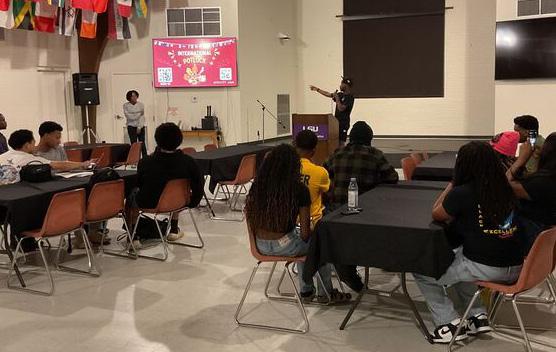
KALEY MELANCON / The Reveille
Graduate student Tracy Lyu presents self-care resources.
JORJA ETHRIDGE / The Reveille
NSBE senator and international zone chair Habeeb Falade gives a presentation at the International Potluck in the Global Community Center.
Manship professor talks AI redefining newsrooms
BY AIDAN ANTHAUME Staff Writer
Artificial intelligence is reshaping journalism in ways that are forcing reporters, editors and media organizations to rethink how they work, says LSU assistant professor Nihar Sreepada.
Sreepada, who researches AI across public relations, journalism, advertising and political communication, said newsrooms are learning to treat AI as a tool. A tool that can make reporting faster, but still requires human oversight.
“AI, by itself, is not a negative or positive tool,” Sreepada said. “It has benefits if you use it in the right way. Something we need to know is that we cannot escape it. In my research, I call this the ‘cautious embrace.’ We’re trying to understand what tools to use, how best to use them and when to stop.”
LSU announced last December that it had joined the AI Alliance, a global collaboration of universities, research institutions and industry partners
SCIENTISTS, from page 3
Horton recalled a trip to Lacombe Parish where she and other members were able to plant mangroves around one of the marshes in the area. That’s similar to their other efforts such as tree planting and marsh grass planting.
CRCL helps them build oyster reefs to help revitalize marshes. Horton said that they use oysters because they naturally filter water. By creating a reef of oysters, they are inviting more oysters to come and build on top to create a reef of water filters.
“If you’re in any science, you’re going to be interested in this,” Horton said. “We even have humanities majors that are part of this.”
Wetland and wildlife ecology professor Andy Nyman is the faculty adviser of SWS. He said his biggest role is to sit back and let the students run the organization,
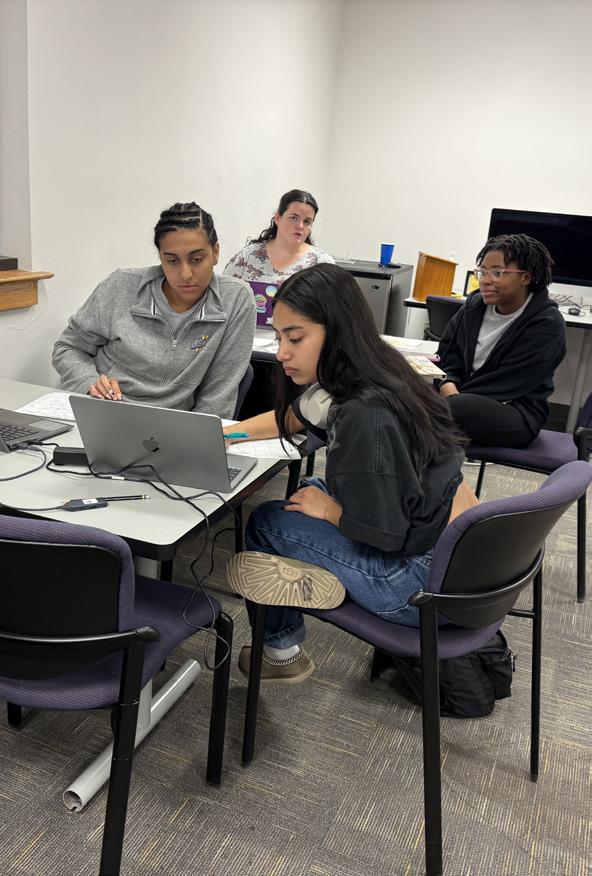
working on safe and responsible AI deployment.
Alongside the alliance, LSU’s website notes that more than 180 faculty members are engaged with AI research supported by $7 million in funded projects over the last five years. That includes the launch of MikeGPT, an LSU-specific AI assistant and a partnership between LSU and Data² to tackle cybersecurity, energy and infrastructure challenges.
“Just like you use Google or social media, AI is another tool that can help with a lot of things,” Sreepada said. “We either overhype it or underrate it, but it’s still a tool.”
With this momentum, Sreepada’s remarks carry a new urgency: Students now studying journalism may soon enter newsrooms that already use AI-driven tools for monitoring, transcription and pattern detection.
“Major outlets like the Associated Press are using AI to generate data-driven stories and basic election results, weather updates and market reports automatically,” Sreepada said.
allowing them to make important decisions and come up with ideas on their own.
Nyman is a member of the professional SWS. He said that SWS is different from most of the other societies he is involved with because it is not only researchers, but others from more applicationbased jobs in the government and private industries.
Beyond helping themselves and the wetlands around them, Nyman said the students involved are also educating grade school students so they can learn more about preservation.
“I’m hoping it’s a stepping stone for them to stay active,” Nyman said. “I’m hoping this is a stepping stone for them to do that and to stay involved.”
One of the most unique aspects of SWS is that it is not departmentally focused, Nyman said. Wetlands are such a broad area of
FIRST GEN, from page 3
is what the Center of Academic Success set out to do. In the basement of Coates Hall, students could work with a CAS Promise Scholar to help plan out their final exams.
One of five mentors would talk to a student one-on-one about how school was going. Tearra Frank, a CAS mentor, said they prioritize telling personal stories and just chatting with students.
This was clear as mentors and students shared their experiences in friendly conversations. Mentors asked questions such as how the student usually studied and if they were enjoying their classes.
While talking, students looked at the remaining month of the semester and wrote down final exams, quizzes and papers that were
He explained how tools such as Otter.ai and Google transcription software have already changed how journalists record and process interviews.
While technology can streamline work, it also raises ethical questions.
“Different organizations have different policies,” he said. “In journalism, authenticity has to be there. Public relations specialists might use it more openly, but journalists have to be careful.”
Sreepada shared examples of major newsrooms building their own AI systems. Reuters, for instance, has developed Lynx Insights, a program that detects story patterns across massive data sets, while The Washington Post uses Heliograf, an in-house AI that tracks breaking news and writes short updates.
“Say I want to look at all the cases of human trafficking in the past two to three years,” he said. “Then they can use that and redefine patterns across the past two years. That frees up reporters for more in-depth stories. Before, you used to look for news.
research and allow environmental science, ecology, engineering and other majors to connect and work towards helping preserve the land.
Nyman said he hopes more students from outside the research field, specifically communications, will join to help spread the word about the work they are doing.
“Although there is a lot we can learn, a researcher can figure out to help us manage our planet more efficiently, the biggest challengers really are just community in what we know to the
due in a planner.
Now you can ask for it. That’s journalism being redefined.”
Sreepada demonstrated The Washington Post’s Ask the Post AI, a collaboration between OpenAI that allows readers to ask questions and get summarized answers based on the outlet’s reporting.
LSU officials acknowledge AI is not foolproof. MikeGPT’s documentation states that, although the system strives for accuracy, users should verify all information.
“Editors are treating AI as a starting point, not a final copy,” he said. “It requires human factchecking and editing and I can’t stress that enough. Many newsrooms and workshops are starting to educate journalists on AI tools and ethics.”
AP has taken a similar stance, directing reporters to treat AI outputs as “unvetted source material” that is useful for speed but never a substitute for human reporting.
“The way I see AI literacy is what tools we use, how to use them and when to stop using them,” Sreepada said.
general public,” Nyman said.
The next international meeting of SWS will take place in New Orleans in June 2026. To learn more about joining the group, find their page on TigerLink.

Along with the planner, CAS provided a master to-do list that allowed students to plan out more detailed steps to study including what lectures to go over or what they need to read before classes.
Frank said first generation students struggle with seeking help because they think it is a “them” problem, but that is not the case. She tells students it is okay for their grades to drop after high school while they are dealing with the transition to college.
“I went through that,” Frank said, “but I’m not there anymore so let me show you how I got through that.”
This is what happened for Kassidy Theard, a psychology sophomore, who came hoping to get advice for her upcoming final. Theard said she had not done as
ENGINEERS, from page 3
food included jollof rice, which is a Nigerian dish with West African spices, chips and queso and traditional American desserts like chocolate cake and apple pie.
Eniola Oyadeyi, a mechanical engineering junior, said she joined the NSBE at LSU to connect with other black engineers and students with similar interests. While Oyadeyi is not an international student, she is Nigerian and said the potluck was a good place to share her culture and learn about others. She brought the jollof rice.
Oyadeyi said her favorite parts of the NSBE are the professional development events.
“I’ve learned so much and I’ve met so many different companies,” Oyadeyi said. “It’s a good way to make connections before you graduate college.”
Southern University’s NSBE, which is LSU’s sister chapter, was also at the potluck. Falade said that because neither school has a large international student population, the event helped connect the two small communities.
Katherine Nash is Southern University’s NSBE secretary and international chair and attends both Southern and LSU. She is a sophomore majoring in chemistry at Southern and chemical engineering at LSU.
Nash said this potluck also gave both NSBE chapters a chance to get to know each other before they compete together at the Fall Regional Conference in Houston in late November. She said her favorite part of the event was seeing people that she worked with last year.
“Last year I was the academic excellence chair and I had the chance to work with some of the executive board members from LSU’s chapter,” Nash said. “It’s really nice to see us now in bigger roles within our organizations.”
To learn more about the National Society of Black Engineers, you can follow their Instagram (@nsbe_lsu) or join them on TigerLink.
well as she hoped for on her last biology test and needed advice.
Theard said coming to LSU as a first-generation student was intimidating at first because she did not have anyone to talk to about it. She said her CAS mentor was able to ease her worries about a future class she wanted to take.
On Thursday, students got to hear advice from people who came before them. Five first-generation graduate students sat on a panel talking about their journey and why they chose LSU.
The group shared how being a first generation student can come with a lot of responsibility and pressure to achieve for their families. Many of them shared the experience of not knowing things such as how to be involved in research or what a “Ph.D.” was.
The panel ended with parting
words of advice reminding students to find time for themselves and remember that being a firstgeneration student is all about resilience.
Events concluded Friday with a breakfast that connected students with the committee members.
It all led up to National First Generation Celebration Day on Saturday where students and faculty took over social media with the #LegendsBeginWithFirsts.
Outside the week, Torres said first generation students can still find resources. Programs like the FirstGen Mentor Program offer students a chance to connect with professionals and focus on career readiness.
“The biggest thing is knowing that everything happening this week already happens every single day,” Torres said.
COURTESY OF ALLEN BARCHAK SWS members kayaking in the marsh during trip.
KALEY MELANCON / The Reveille CAS Promise Scholar mentor helping student plan their finals during LSU’s FirstGen Celebration Week.
Grace Yoga + Pilates hosts the hottest yoga party in Baton Rouge
BY LANA LAWSON Staff Writer
You’ve probably never seen anyone do downward dog at Fred’s, but true yoga enthusiasts know that yoga can be practiced anywhere — even at a bar in Tigerland.
On the evening of Nov. 5, Grace Yoga + Pilates rolled out its mats and helped to turn the patio at Fred’s into the ultimate yoga sanctuary. The patio was decorated with yellow and purple lights to set the scene of the atmosphere. As doors opened at 6 p.m., guests began to pile in with their friends, ready to relax and unwind.
The event combined elements of EDM style music and standard yoga poses to create a “party meets practice” atmosphere. It was centered around teaching people in Baton Rouge about yoga in a way that’s fun and accessible.
The owners of Grace Yoga + Pilates are true advocates for getting Baton Rouge more involved with yoga. Shannon Davis and Shelley Mockler have been in the business for over six years, and they described it as peaceful with a big sense of community.
“I think yoga is for everyone, truly,” Mockler said. “Here, people may discover yoga for the first time tonight that have never even considered trying it, and this may be their way in. This may be their first experience. So that’s what we love. We want people.”
For these businesswomen, yoga is more than just a hobby — it’s a lifestyle.
“It has changed our lives,” Davis said. “I think that’s deep to really think about, because there’s so many elements and aspects to it. It’s hard to articulate what yoga has meant for me. It definitely shifted my life in ways that I never would have expected.”
Davis and Mockler were invited to join in on this event by yoga instructor Mark Berger, who occasionally guest teaches at their studio.
Berger felt a sense of nostalgia
entering Fred’s that night. Berger worked at Fred’s during his college years, so being able to come back years later to teach yoga where he once served was a full circle moment for him.
“My favorite thing about Fred’s is the way the owner treated us,” Berger said. “He treated us like we were his kids, and he treated us with respect, and we made sure that we worked harder for him. I’ve owned a couple yoga studios and fitness studios, and I brought that in the way that I treat my employees.”
Berger is a personal trainer and yoga instructor that has been teaching yoga since 2014. He said that yoga became a huge part of his life after being injured from triathlons and running events.
Along with his yoga and fitness adventures, he also takes part in managing EDM festivals. For Berger, mixing EDM with yoga just makes sense.
“EDM does go with a little bit more hype scene stuff, but if you’ve heard the beats per minute in house music specifically, it puts something in you that makes you happier,” Berger said.
Berger feels that this was an event that Baton Rouge needed. He believes it is incredibly important to have events where people can wind down spiritually. Berger hopes that people left his class with an interest in yoga and view it with a more positive outlook.
“The definition of yoga is to unite and to bring people together,” Berger said. “And my personal mantra is to be a bridge. I feel like if I can bridge people to each other, to nature, to culture, to a higher power — whatever that means to them — and with themselves, then I’ve done my job.”
Davis hopes that people who attended the event were able to have a good time and leave feeling inspired to continue doing yoga.
“I hope they realize that yoga is fun, it’s not intimidating, and it’s accessible for all in one way, shape or form,” Davis said.
Many guests loved the experi-
ence and were happy to come and participate. An LSU student from Buffalo, New York, thought the EDM Yoga session was a cool and fun experience.
“I haven’t done a lot of yoga recently, but I thought it was a really good mix between a workout and a way to stretch out,” she said. “I thought it would be weird doing it at a bar, but it was actually really peaceful.”
This attendee found out about this event through her friends from LSU, Ava Sorrentino and Sutton Rockmen. Rockmen discovered the event through Fred’s Instagram and immediately begged her friends to check it out with her.
“I thought it was really fun, and I’m so glad I came,” Sorrentino said. “He was a really good instructor. I think this is a very fun memory to have with my friends.”
Rockmen felt like the EDM music matched perfectly with the usual vibe of Fred’s.
“The atmosphere wasn’t much different compared to a usual night,” said Rockmen. “The music was the same, and I was with my friends. Now, I don’t normally touch the floor, but I do think it was the same amount of fun as a normal Fred’s night.”
The trio expressed gratitude and delight for the event and said they are definitely willing to come back if it happens again.
If you missed this event, don’t worry because this definitely won’t be the last chance to participate. At the end of the class, Berger expressed interest in wanting to do a similar event in the future.
If you go on a typical day to Grace Yoga + Pilates, you won’t be guaranteed to hear EDM at your session. What you can expect, however, is a welcoming and kindhearted staff that are willing to teach you everything you need to know about yoga. Whether it’s a quiet studio or a lively bar, the EDM Yoga event was a great example of how a calming environment can exist anywhere, even at Fred’s.


PILAR FRANKLIN / The Reveille
Attendees join a nighttime EDM yoga class on Nov. 5, at Fred’s in Tigerland in Baton Rouge, La.
TUSSLE IN TUSCALOOSA
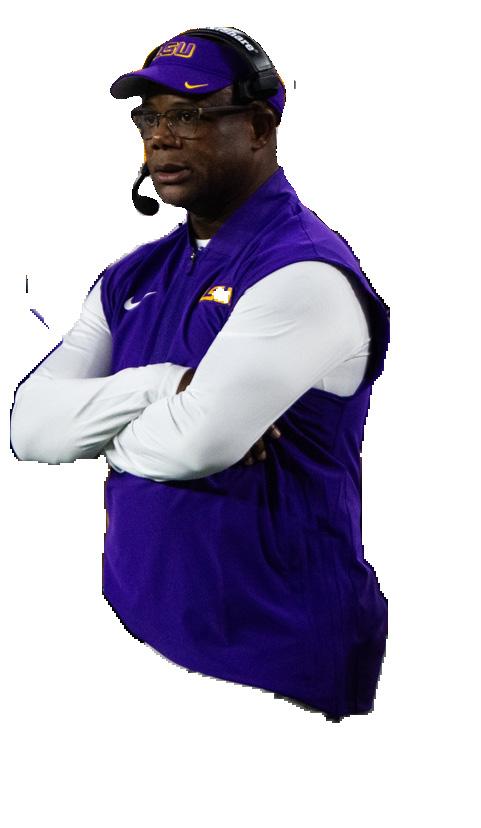




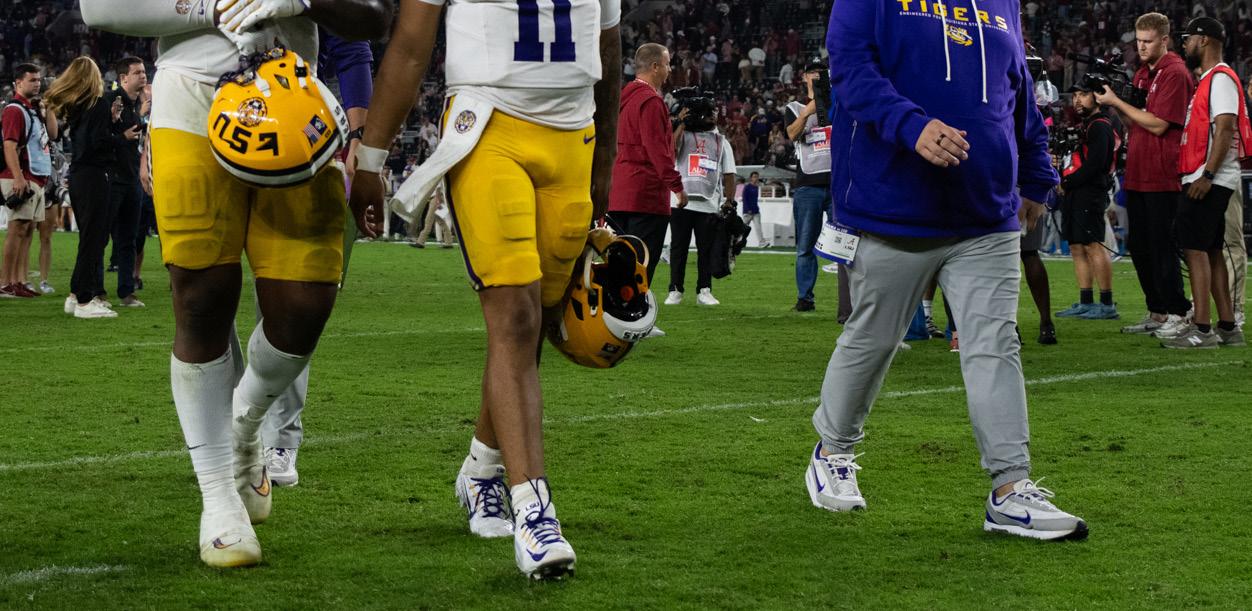

The Tigers suffer a 20-9 loss to Alabama on Nov. 8 at Bryant-Denny Stadium in Tuscaloosa, Al.






LSU football sophomore punter Grant Chadwick (90), freshman long snapper Silas Hall (43), and fifth-year senior placekicker Damian Ramos (34)
LSU fan Deangelo Sanchez cheers.
LSU football freshman running back Harlem Berry (22) has his undershirt torn.
LSU football fifth-year senior quarterback Garrett Nussmeier (18) speaks to Alabama quarterback Ty Simpson (15).
LSU football interim head coach Frank Wilson watches a play.
Photos by Erin Barker & Alexis Persicke | Design by Riley White
The LSU football offensive line huddles before the play.
LSU football sophomore quarterback Michael Van Buren Jr. (11) walks off the field with fifth-year senior defensive lineman Bernard Gooden (88).
This new Baton Rouge cafe is brewing inclusivity at every step
BY MIA HATTAWAY Staff Writer
Baton Rouge’s newest coffee shop, STIR Coffee, is sugar, spice and everything nice. Located 20 miles east of LSU at 15405 Airline Highway, this quaint cafe is not only a great study spot, but the perfect space to foster friendship, connect with your community and see the impact of inclusion — all while sipping on a delicious, handcrafted drink.
Though the cafe has gained traction on social media for its inclusive business model, the story goes far beyond what you see at the front door.
Founded by Katie Jenkins, owner of Grace Therapy Center, STIR employs individuals with intellectual and developmental disabilities, offering both job experience and a sense of belonging.
The Grace Therapy Center is an ABA-based therapy that helps children with communication, school and self-management. As Jenkins reflected on individuals with disabilities in Louisiana, she realized the lack of support for adults.
“We were looking for where the gaps are in the community to kind of offer a different service,” Jenkins said. “We found that employment is really one of the big-

The storefront of STIR Coffee in Baton Rouge, La.
ger issues in Baton Rouge.”
When looking into different business types, Jenkins decided that coffee would be the best option. Not only is the barrier to entry relatively low, but coffee offers a standardization for green service experience.
From concept, STIR took around eight months to open.
Training began in the summer, where customer relations and barista skills were taught to employees. Since Jenkins, along with other staff in managerial roles, had experience with ABA therapy, leading people with disabilities was one of the more intuitive pieces of creating STIR.
“Our goal here at STIR is to employ at least 80% of our employees with special needs,” Jenkins said.
“We’re hoping if we can provide that model, other businesses in the community could do 1% or 5%.”
As STIR employees gain more experience, Jenkins hopes to line up opportunities with other Baton Rouge companies.
“I want them to go out and get bigger, better jobs,” Jenkins said. “Hopefully we can get to that point because they got that experience here.”
Jenkins opened STIR alongside Strides, a nonprofit which supports people with intellectual and developmental disabilities by pro -
viding interview preparation and training for future employment with local partners.
STIR brews inclusivity at every step — starting with the name. While the word obviously connects to coffee, it’s also an allegory for the sense of community the store creates.
“That’s really the mission: to mix these guys straight into real life and to get people coming in and interacting with them and seeing that they should be included in everything,” Jenkins said.
In tandem with the mission, Jenkins wants STIR to invoke a sense of warmth and comfort into every person that comes in.
“We wanted the feeling when you walked in here to be calming and welcoming,” she said. “You don’t really want to rush out, you want to kind of stick around.”
The ease that comes with hanging out in STIR Coffee is reflective of a larger culture that defines Southern hospitality. A Baton Rouge native, Jenkins knows firsthand the strength of community in the bayou.
“One thing about Baton Rouge is there’s a lot of helpful people, and there’s a lot of people who want to build a good community,” Jenkins said.
Jenkins went on to explain that neighborly care is intuitive in the
South, especially during peak hurricane season. She believes that it’s hard in everyday life to prioritize this practice of connection.
“We get very, very busy and very caught up in our own dayto-day that we forget that you can go and experience other humans,” Jenkins explained. “Hopefully, this can be that place year-round. I think Baton Rouge wants that community.”
Jenkins sees STIR as not only a coffee shop, but a way to build relationships and share a message.
“I don’t want people to walk in here and just have a cup of coffee and say, ‘That’s nice,’ and leave and forget until the next time,” Jenkins said. “It needs to be a movement. It needs to be something that they’re leaving here thinking, ‘How could I employ one of these people? How could I offer this job opportunity and make Baton Rouge truly an inclusive environment?’”
STIR is “grounded” in community, support and connection and will undoubtedly become a staple spot for caffeine for many Baton Rougians.
“I hope [customers] feel inspired to make a difference, whatever that difference looks like,” Jenkins said. “I hope they feel a little bit of joy in their day, and that they got more than just a cup of coffee from their visit.”
Feel the holiday spirit early with LSU Theatre’s ‘Miss Bennet’
BY SARAH WALTON Staff Writer
With the start of November, there is only a little time left before the Christmas season comes around. LSU is bringing it even earlier with its latest show, “Miss Bennet: Christmas at Pemberley.”
Swine Palace Theatre’s newest show is a play written by Lauren Gunderson and Margot Melcon. It stands as a spiritual successor to the beloved Jane Austen book, “Pride and Prejudice.”
The play follows Mary Bennet, the middle sister of the Bennet girls who is known for her love of books and her lack of romantic interest. Everything changes one Christmas when she
meets Arthur De Bourgh, a quiet bookworm who recently inherited a large estate.
De Bourgh is played by Michael C. Hyatt, a Master of Fine Arts with the LSU School of Theatre. He said he’s delighted to be part of the production.
“We’re certainly starting the Christmas season off at the right time — beginning of November, we’re jumping right into it,” Hyatt said. “I know Christmas can be a challenging season for some people, but I think this really leans to joy and happiness.”
Hyatt has had fun with the fact that his character is the only one that doesn’t appear in the original book. This allowed him to create a character that isn’t be -
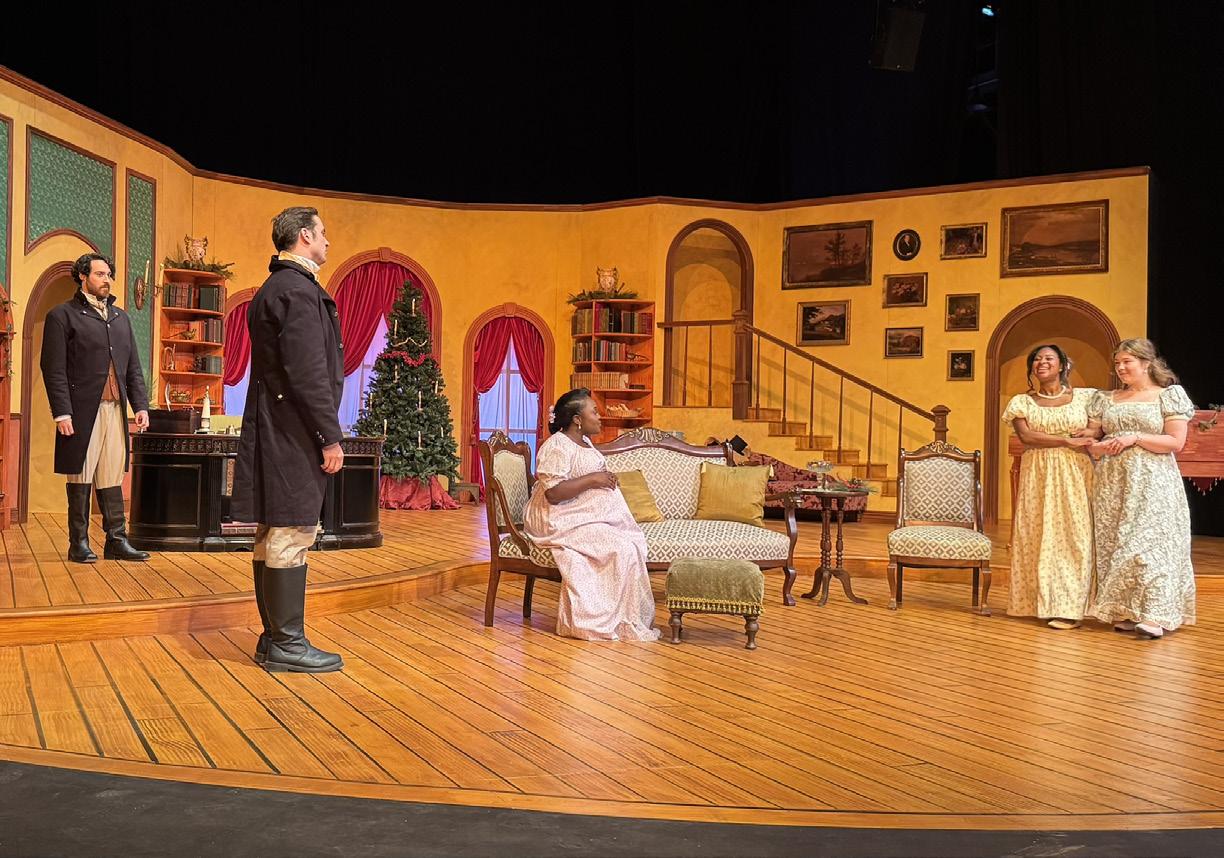
holden to previous adaptations.
“It’s fun to approach a sort of new character within this world, but I definitely was inspired by the versions of ‘Pride and Prejudice’ I have seen,” Hyatt said. “He’s the romantic interest, so looking at Darcy and Bingley from ‘Pride and Prejudice’ and some of the quirkier characters as well, I think there’s a lot of those flavors I borrowed.”
“Pride and Prejudice” was written back in 1813 by Jane Austen, and over the past 200 years, the world has fallen in love with the story over and over again. “Miss Bennet: Christmas at Pemberley” is something a little new, showing the characters after some time and in the Christmas spirit.
Christina Griffey is a Theatrical Design MFA with the LSU School of Theatre, as well as the set designer for the show. Christmas is one of her favorite holidays, and “Bennet” has been one of her passions for the past months. For her, the best part of the production is seeing the cast unified in creating something for the holiday season.
“To give people a piece of joy during this season has been my favorite thing, ultimately,” said Griffey. “We’re all on the same page about creating something delightful that brings joy and highlights human kindness. I especially think during times like this, that is really important.”
Designing for a theatrical pro -

duction is much different from film or acting. A lot of work goes into research, brainstorming and preparing, and then comes the building and the execution.
“My first conversation with the director was my compass for where it was headed, and ultimately things that kept coming up in conversation with her were focusing on delight and human kindness,” Griffey said.
According to Griffey, much of the director’s vision was focused on timelessness over historical accuracy. A lot of her own focus, however, centered around bringing warmth and the magic of Christmas to the stage.
From the doors and windows to even the way the set is shaped, Griffey focused on ex-
pressing the softness that she felt from the script. She said that one of her hopes was that the set felt like a hug for viewers. The color pallet was also important, full of warm, rich colors that exude the brightness of the holiday season.
“I thought it was going to end up looking a specific way, and it kind of ended up taking its own shape,” Griffey said. “I think that’s what I love about being a set designer. I feel like a gardener — I’m planting the seed and I’m nourishing the seed with water.”
“Miss Bennet: Christmas at Pemberley” will be held in the Reilly Theatre from Nov. 6 to 16. Tickets and information is available on the LSU School of Theatre website.
COURTESY OF LSU THEATRE
A photo of “Miss Bennet: Christmas at Pemberley.”
COURTESY OF LSU THEATRE
A photo of “Miss Bennet: Christmas at Pemberley.”
COURTESY OF STIR COFFEE
THEATRE
TAKE AWAYS
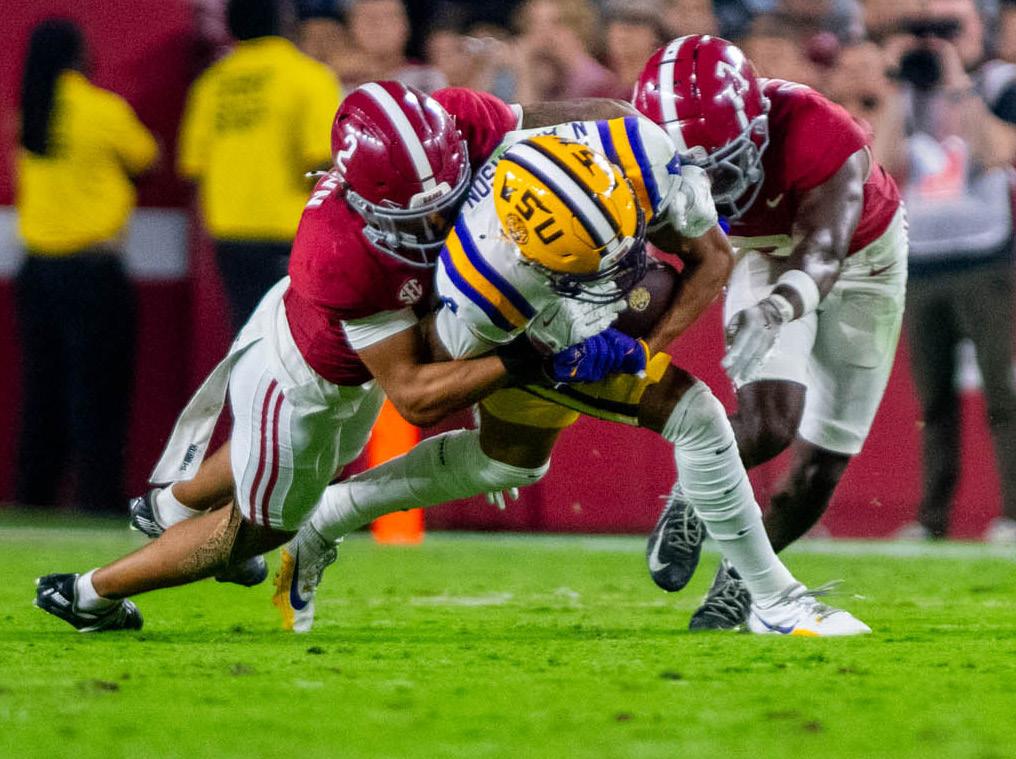
BY BRETT KEMPER Staff Writer
Under interim head coach Frank Wilson, LSU football travelled to Alabama to face the No. 4 Crimson Tide with the goal of upsetting a team that has been flawless since Week 2 of the 2025 season.
The Tide would go on to defeat the Tigers 20-9 in a penalty-ridden, momentumless disappointment for LSU.
The story became clear midway through the second quarter after a 13-yard Ryan Williams touchdown reception put LSU down 17-3.
Here are the three takeaways from LSU’s haunting night in Tuscaloosa.
Offense allergic to the end zone
The Tigers, in a trend that’s followed them all year, struggled in the red zone and only managed to put up nine total points against the Tide despite making three trips to Alabama’s 20-yard line.
When they weren’t kicking field goals instead of scoring touchdowns, the Tigers’ drives were ending deep in their own territory; six times, their offensive drives ended inside their own 30-yard line, and they made it past their own 41 before punting it away only once.
When it wasn’t procedural penalties, it was incompletions, turnovers and injuries.
While the Tigers were only charged with two drops, the reality was much worse. The Tigers lost a total of 11 opportunities to get the ball downfield. Late in the game, a wide-open Trey’Dez Green dropped a ball with nothing but green grass in front of him, which eventually would seal the game.
They also lost two fumbles, once in the first and once in the fourth quarter. In the first quarter, it was a Bauer Sharp fumble after catching what would have been a first down to extend the drive, and in the fourth, it was backup quarterback Michael Van Buren Jr., trying to extend the play that would hammer the final nail in the coffin for LSU.
Wide receivers Aaron Anderson and Kyle Parker also left the game with injuries, leaving both Nussmeier and Van Buren without two of their most versatile targets on the field.
The o-line is the thorn in LSU’s side LSU had seven offensive penalties, six of them on its offensive line unit.
Many knew at the beginning of the year just how “youthful,” as Wilson put it, this offensive line unit was.
But after a 17-10 victory over Clemson in Week 1 against a good defensive front, the noise around those issues seemed to quiet. The same went for when the Tigers beat Florida just 2010 despite a five-interception effort by the defense.
Ever since, that group of five has been riddled with injuries, penalties and inefficiency.
The Tigers’ offensive line, coached by Brad Davis, has been the biggest source of ire for this LSU offense, and it was on full display against Alabama.
Against the Tide, three of those seven penalties came inside the Alabama 30-yard line, twice forcing the Tigers to kick a field goal after making big third down conversions that initially seemed so promising.
“I think it’s a lack of consistency,” center Braelin Moore
What Frank Wilson and players said about Nussmeier, Van Buren Jr.
BY AINSLEY FLOOD Deputy Sports Editor
Another agonizing defeat for LSU football saw quarterback Garrett Nussmeier replaced, once again, by backup Michael Van Buren in the second half.
In Tuscaloosa, the team was down 11 points to Alabama, and the offense had yet to produce a touchdown with six and a half minutes left in the third quarter. That’s when a change was made, which interim head coach Frank Wilson addressed in the postgame press conference.
ALEXIS PERSICKE / The Reveille
said. “There are plays that we hit just like we saw in the first quarter. We hit a 50-something yard run with Harlem [Berry], and then we missed assignments, and we have TFLs [tackles for loss] and offside penalties.”
Defense continues to expose weaknesses
While the LSU defense kept this game alive with huge fourth down stops, forcing field goals and turnovers on downs, it got beaten on chunk plays one too many times.
Well into the fourth quarter, the game was within reach with LSU piling on a couple of field goals to make it 17-9. It was too little, too late, as a highly touted defense in coverage was no match for Alabama QB Ty Simpson on several drives that turned into points for the Tide.
Alabama had eight big plays, six of them more than 20 yards and all passes by Simpson.
Senior linebacker West Weeks summed it all up in one statement.
“It’s just good plays by them and us not doing our jobs,” Weeks said. “At the end of the day, football comes down to a few plays, and they made those plays when we didn’t.”
The Tigers left with their third consecutive loss, holding a 5-4 record.
On Saturday, they’ll face Arkansas, a team that is in an equally tough spot without a head coach, as Sam Pittman was let go by the Razorbacks earlier this year.
“You know, I haven’t put that kind of thought in it right now, right now. I just want to be there for our players, to let them know we’re going to be all right, to pick their heads up,” Wilson said.
“I thought he started the game off extremely well,” Wilson said. “As we went into the depths of the game, we just thought it was an opportunity for us to change it, to throw their defense off. And so we went with the change necessary.”
Nussmeier threw for only 121 yards with a completion rate of 86% before his exit from the game. He didn’t gain any yards in rushing, and he didn’t throw long either, with his furthest traveling just 20 yards.
This was Wilson’s first game at the helm after former head coach Brian Kelly was fired after the team’s 49-25 home loss to Texas A&M in Week 9. Nussmeier’s starting position was in contest after declining performances and sophomore Van Buren’s impressive late-game appearances. Yet, Wilson confirmed fifth-year senior Nussmeier would keep the spot last week.
While Nussmeier may be
first on the field, it’s become more than likely for him not to finish there.
“He came up on the sidelines after every break, just trying to keep our spirits up and juicing us,” Moore said. “Even though he wasn’t in the game, he was still right there with us.”
In his time off the bench, Van Buren went 5 for 11 and managed passing 52 yards.
“I thought he was solid,” Wilson said. “There were some things that were obvious: pushing the pockets, stepping up, delivering passes, escaping extended plays and picking those first rounds with his legs. I’d like him to have two hands on the ball in the pocket, so we don’t get that last one swatted away.”
The substitute QB most notably threw back-to-back 17-yard passes, one complete and one ruled incomplete upon review, in his first few minutes. On 3rdand-13 in the fourth, he threw a 19-yard ball to Barion Brown to keep the Tigers on the field.
Unfortunately for Van Buren, he and the offensive line cost LSU 20 yards after two sacks and a fumble for the turnover.
“He was able to get out of the pocket and pick up some yards when we needed to,” teammate Braelin Moore said. “It’s Alabama. It’s a hostile environment.”
His efforts weren’t nearly enough to keep the Tigers in the game, though, as they lost 20-9 surrounded by Crimson. In the home stretch of its season, LSU is still missing consistency in its QB.

ERIN BARKER / The Reveille LSU football fifth-year senior quarterback Garrett Nussmeier (18) talks to sophomore quarterback Michael Van Buren Jr. (11) on Nov. 8 during LSU’s 20-9 loss to Alabama at Bryant-Denny Stadium in Tuscaloosa, Al.
SOCCER
Soccer’s SEC championship hopes ripped away in shootout
BY TRIPP BUHLER & DELANEY POTTHAST Staff Writers
Both times LSU soccer has been in the SEC championship, the game has ended in a penalty kick shootout after a 1-1 score.
In 2018, that shootout fell in LSU’s favor. On Sunday, the Tigers weren’t so lucky.
The Tigers controlled the first half with a 1-0 lead but could not hold off a Vanderbilt comeback in the second.
The teams ended the game tied with a goal each, and after double overtime, silence took over the stands for the intense 10 rounds of penalty kicks that followed.
Eight consecutive makes gave Vanderbilt an 8-7 edge in the tenth round. LSU senior captain Jazmin Ferguson’s attempt to tie it up was saved, giving the win to the Commodores.
“I’m just so proud of [the team], proud of everyone,” LSU goalkeeper Audur Scheving said after facing 10 penalty kicks. “It’s a tough game, tired legs, four games in one week. I think we did amazing.”
LSU made it to the brink of an SEC championship. It all started with early control in the first
half. The Tigers kept the ball in enemy territory for the first few minutes of the game, pressuring the Commodore defense.
It was evident early that both teams came to play a physical game, and Vanderbilt made many Tigers hit the deck. The Commodores had three fouls within the first eight minutes and many others that LSU fans wanted called.
Despite the early adversity, the Tigers’ first and only goal came quickly.
LSU received a corner kick in the 25th minute, and their set piece magic worked once again as head coach Sian Hudson had all players run toward the goal as Ida Hermannsdottir delivered the kick.
Gabbi Ceballos flawlessly headed the ball to give the Tigers a 1-0 lead.
Vanderbilt was feeling the pressure and becoming feeble on offense. Foul calls were a constant source of contention between the teams, but LSU was not deterred by what it could not control. Ferguson, Sydney Cheesman and Jocelyn Ollivierre continued to hold down the defense and make clutch clears to stop shot opportunities for Vanderbilt.
At the net, Scheving got her third straight start of the week. She went on to make five saves in the 110 minutes of play.
After Ceballos’ goal, the first half saw no more shots, just tough and tight defense. The clock dipped down to all zeroes, and LSU took its 1-0 lead into the locker room.
Throughout the first period, it was clear both teams were growing weary, especially LSU, which played one more game in the tournament than Vanderbilt.
“That extra game probably took a little bit more out of our legs, but the girls emptied the tank,” Hudson said after the game.
Headed into the second half with a crucial lead over the Commodores and the game on the line, clear pressure was applied to the leading Baton Rouge team. Multiple yellows were given to the Tigers in the second half, including two on players and one on Hudson. The most pivotal yellow was handed to midfielder Makenna Dominguez in the 68th minute, which resulted in a costly free kick for Vanderbilt.
Vanderbilt took the shot on goal from the front of LSU’s box. Jumping for the block, Scheving
was knocked down in the action, and a rebound off of Vivian Akyirem gave the Commodores the tying goal in the back of the net.
With just five minutes remaining in the half, both teams powered on in search of a second goal. As the clock ticked down to zero, though, the scoreline remained tied, and both teams prepared for overtime.
As the first overtime round progressed, LSU continued to apply pressure on the Commodores’ net, but neither team scored, sending it into double overtime.
Energy seemed tense for both teams in the second overtime as they laid out shots on goal. Despite pressurized efforts from both sides, the ball bounced back and forth in possession with no give by either side.
With just a minute left, a call on the Commodores gave the Tigers a last chance effort at a free kick goal, but a save by Vanderbilt’s SEC Goalkeeper of the Year Sara Wojdelko sent the game into a penalty kick shootout.
LSU was ahead in the first five rounds and had two opportunities to win. On the fourth kick, the Tigers were up 3-1, but Gadea Blanco Gonzalez missed what could’ve been the winning penalty.
After Vanderbilt tied it at three, Morgan Witz stepped up in the fifth position. Wojdelko saved her shot to send the shootout into sudden death. Vanderbilt would shoot first, followed by an LSU player, until one missed and the other scored.
A suspenseful 10 rounds ensued, and both teams reached a 7-7 tie by the end of the ninth. After a Vanderbilt goal to take the lead, Ferguson was next in line.
She couldn’t complete the job. Her shot was low and to the left, and Wojdelko was able to dive behind it just in time.
After the game, Hudson acknowledged the fact that the two best teams in the SEC were truly playing like it, making the game tight. She thought LSU was the better team in regulation, but it couldn’t capitalize on its opportunities to swerve overtime.
“I think we had a great run,” LSU forward Ava Galligan said. “I think we were the underdog all the way through. I think we’re still the underdog.”
Despite the devastating ending to their title run, the Tigers still have a chance to redeem themselves in the NCAA Tournament to finish the postseason.


Lessons from a fly on the wall: We have forgotten decorum

AVA’S POV
AVA FRANCIS Columnist
At some point in our lives, we’ve all wondered what it’s like to be a fly on the wall. Last Sunday, I unwillingly found out.
Allow me to set the scene.
I was enjoying a brunch date at a popular local restaurant near campus. The weather was splendid, which made my choice of patio seating inviting. However, if I could change one thing, it wouldn’t be my company, the food or the scenery — just the table of frat guys sitting next to us. The grotesque things that were coming out of their mouths so effortlessly was alarming but far from surprising.
We are living in a time where decorum is non-existent.
Our presence did not cause them to shy away from their disturbing, racist, sexist, homophobic exchange. There was no regard for our table, the server or the elderly couple seated next
to them. Not only was the female server uncomfortable, but the couple at the next table was also clearly upset by the use of their profanity and crude remarks.
Our waitress told us that the couple who left were regulars and were, in fact, upset.
I’m sure the increased volume of their conversation was either deliberate, in order to provoke a reaction from us, or it was merely a side effect of their entitlement and deep-seated misogyny. It was total rage bait.
Not to mention, there was one girl, in addition to the five guys, sitting around the table rating the performances of the girls they had slept with over Halloweekend.
She wasn’t any better than the guys she seemed so proud to call confidants. I felt embarrassed for her. Instead of shutting down their conversation, she participated and made a slew of ignorant remarks herself.
She said she was first-gen, but still allowed racist remarks about her own ethnicity. She sat at a table with these guys and let
them sexualize and berate women of color from a list of different cultural backgrounds.
She was a willing participant in the vitriolic hate speech they spewed that was harmful to all women — including herself. If she had common sense, she would realize she was potentially jeopardizing her own safety. So whatever validation or safety she thought she was receiving from participating isn’t real.
I wonder if she knows being a “pick-me girl” is overrated. Blink if you need help, girl.
It’s alarming, because I wondered if she was simply desensitized to these attitudes and if so, what kind of manipulation had she possibly been subjected to that would shape her into being complicit with this behavior?
It’s sad to know these sentiments are often expressed behind closed doors, but even more sad to have them said out in the open right next to us.
I had no clue my brunch would come with eggs and a side of insufferable commentary.
It’s moments like these when
one’s hope in humanity is lost.
Hearing this type of harmful discussion coming from LSU students who are future doctors, lawyers, teachers, lawmakers and world leaders is unsettling.
I recommend steering clear of both obnoxious, entitled misogynists and “pick me girls” in all social settings, but unfortunately, we share classes and other common areas all too often with potentially dangerous people.
These types are the reason most of us guard our drinks so diligently, carry pepper spray and avoid dating without thorough background checks.
Hearing an aggressive conversation about sexual encounters with multiple girls over the span of two days and rating them was just wild timing, knowing that Halloweekend is known to have high rates of sexual assaults on college campuses. We can only hope the exploits they bragged about were consensual.
I urge everyone to be careful and vet the people you’re spending time with, because, as my plus-one Tracy said, “You can
easily end up as a punchline at brunch, or, even worse, a statistic.”
And for the guy who sat mute in the presence of this treacherous behavior, think again about the company you keep and how you compromise yourself and whatever values you think you have in these situations when you seemingly don’t agree with your party. Don’t break bread with people whose beliefs are in direct conflict with yours. Your apologetic look as we exchanged eye contact wasn’t enough. In this case, your silence is violence, sir.
Bring back decorum. Bring back etiquette or stay at home. No one should be subjected to your nonsense, because you needed an audience with your cup of coffee.You never know who you may be sitting next to. It could be a professor, a future employer or your school newspaper opinion columnist.
Ava Francis is a 22-year-old journalism major from New Orleans.
U.S. Democrats need to learn from the Netherlands’ strategy

CRAWFORD’S CORNER
GORDON CRAWFORD Columnist
On Oct. 29, 2025, the denizens of the Netherlands went to the polls to elect a new parliament following the collapse of the incumbent right-wing coalition government. For much of the night, the ruling Party for Freedom, or PVV, a far-right populist led by long-time Dutch politics fixture Geert Wilders, led in the polls.
However, late in the evening, the centrist liberal Democrats 66 surged ahead to tie the PVV as the largest party in the House of Representatives, and as the recipient of the highest popular vote have received the first chance at forming a government.
So, why should you care about an election in a nation across the sea three times smaller than Louisiana?
Well, the Netherlands actually plays a much greater role on the world stage than you might realize, and policy shifts in the na-
EDITORIAL BOARD
Jason Willis Editor in Chief
Olivia Tomlinson
Managing Editor
Courtney Bell News Editor
Chloe Richmond
Sports Editor
Garrett McEntee Opinion Editor
tion can have a significant ripple effect regionally and globally.
Despite what its small size may indicate, the Netherlands is one of the most important global economic and political hubs. The port of Rotterdam is Europe’s largest, moving 436 million tons of freight every year. It regularly ranks as one of the best countries in Europe to do business, and as such, hosts dozens of major multinationals’ European headquarters, including Tesla, Cisco and Nike.
The significant economic might of the Netherlands, along with deep historical roots based in Dutch support for American revolutionaries, has thus led to deep economic ties between the American and Dutch economies. Many Dutch companies are mainstays in America, like Heineken and Stellantis, and Dutch-U.S. trade supports over 1 million American jobs as well.
The state of Louisiana too has a unique relationship with the Netherlands. Shell is one of the largest investors in the state, with the Shell Norco facility in St. Charles Parish alone generating $71 million in taxes per year
though the environmental consequences of its operations have been immense as well.
The Dutch government of the past year has been relatively unstable, resting on a shaky coalition of the largest right-wing parties in the Netherlands, most of whom were initially highly reluctant to work with the PVV due to the cordon sanitaire, an informal agreement amongst the parliamentary parties to freeze the PVV out of government.
The return of the D66 from near-death under the leadership of Rob Jetten thus presents a renewed opportunity for the Netherlands to commit to a decisive economic policy, especially one that prioritizes European partnerships, relationships which the PVV have been highly critical of. It remains to be seen, however, whether the centrist party will lean more to the left or right when determining its economic direction.
The D66’s pro-European stance will certainly have a significant regional impact as well. The Netherlands usually maintains a prominent role in European diplomacy but that role has
receded over the past year in the weak Schoof cabinet. A D66led cabinet will almost certainly mean a full recommitment to collaborative policies with other European countries.
However, there is one major issue where the D66 remains somewhat vague: immigration, one of the key issues dividing the European Union. This is where the D66’s ideological flexibility may truly afford it major power within European policy. The D66 currently advocates a streamlined asylum process, but it has also at times leaned conservative in its immigration rhetoric. Thus, it is likely the Dutch will serve as key mediators between European partners with contrasting migrant policies.
Global liberal parties have a lot to learn from the D66. Its model of pragmatism differs greatly from that practiced by the Democratic Party here. Democratic “pragmatism” usually involves refusing to stake out clear policy positions, relying excessively on buzzwords like hope and change, and promises of incremental, measured change.
The D66 was similarly non-ideo -
logical, and its platform remains vague in many areas, but it actually sought to reach out directly to voters and was unafraid to incorporate bold, popular policies into its agenda.
Jetten’s personal transformation from a stiff and awkward bureaucrat to an energetic young visionary should also serve as inspiration for Democrats here. Jetten was successfully able to leverage his party’s time out of government to reinvent himself and his party as a formidable opposition force. While Jetten is set to be both the youngest and first gay prime minister of the Netherlands, he de-emphasized identity politics and instead presented himself as a competent figure who can get policies passed and effectively take on the far-right. Democrats could learn a lot from a leader like Jetten. Go directly to the people, be unafraid to take a bold stance, and even a party in shambles can come out of nowhere and give the establishment a kick in the teeth.
Gordon Crawford is a 19-yearold political science major from Gonzales, La.
Editorial Policies and Procedures Quote of the Week
The Reveille (USPS 145-800) is written, edited and produced solely by students of Louisiana State University. The Reveille is an independent entity of the Office of Student Media within the Manship School of Mass Communication. Signed opinions are those of the author and do not necessarily represent the views of the editor, The Reveille or the university. Letters submitted for publication should be sent via e-mail to editor@lsu.edu or delivered to B-39 Hodges Hall. They must be 400 words or less. Letters must provide a contact phone number for verification purposes, which will not be printed. The Reveille reserves the right to edit letters and guest columns for space consideration while preserving the original intent. The Reveille also reserves the right to reject any letter without notification of the author. Writers must include their full names and phone numbers. The Reveille’s editor in chief, hired every semester by the LSU Student Media Board, has final authority on all editorial decisions.
“The superfluous, a very necessary thing”
A dispatch on new findings from our state’s best institutions
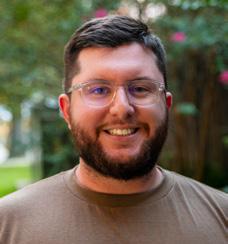
BERGERON’S BRIEFINGS
THOMAS BERGERON Columnist
Editor’s note: The following column is satire.
Heroes venerated and enemies vanquished Salutations, comrades. In another glorious month for our beloved Republic, Comrade First General Secretary Jeff Landry has presided over another triumph of patriotic virtue.
Heroes of our beloved Union will be memorialized, counterrevolutionaries have been eradicated, the sacred right of the vote has been preserved for our fellow comrades and new studies from our state’s best institutions find our citizens’ drinking water may lead to longer life.
Hero of the American Republic memorialized
The Intellectual Committee of Louisiana State University, under the direction of the guiding hand of Comrade Secretary Landry, has initiated plans to erect a memorial commemorating the life and legacy of philosopher-patriot, Hero of the American People’s Republican Union, Comrade Charles James Kirk.
Comrade Kirk dedicated his life to advancing patriotic thought and American values, all the while battling the indoctrinators of bourgeois education. Comrade Kirk’s visage is planned to be positioned
among the pantheon of heroes commemorated in the Plaza of Champions adjacent to the Great Arena of the Proletariat — serving as an eternal reminder of inspiring ideological purity and providing hope for those patriots around the world still suppressed by dangerous liberal ideology.
The Ministry of Communications has released initial instructions requiring citizens to attend weekly statue genuflections.
Purged from the people’s game
Comrade First Secretary Landry has distributed a righteous act of justice for the proletariat by eliminating subversive elements infecting our glorious football team. Enemies of the people Brian Kelly and Scott Woodward have been terminated and arrested immediately following a string of unacceptable offenses to our great Republic. These bourgeois infiltrators are set to be tried for the crimes of “anti-victory play-calling”, “antisocial behavior” and “insufficient enthusiasm for revolutionary spirit.”
Inspectors from the Central Committee will continue investigating members of LSU’s Athletic Committee, hoping to root out collaborators and restore integrity to our glorious athletic teams.
Heroic border guards delay deployment
In an act of true democratic values, Comrade Civic Commissar Sid Edwards has requested the elite units of the Internal

Civic Enforcers (ICE) withhold delivering justice to the regressive agitator elements in our beloved city of Baton Rouge until the end of the sacred Electoral Week. This decree is intended to “reduce cerebral strain” for the duration of this exercise in civic duty.
Approved commentators from the State Directorate of Cognitive Strain Reduction praised the move as a “model example of placing our fellow comrade’s mental well-being first. A reduction in external stressors is a reduction in thought.”
New findings in water
A new study commissioned by the State Service for Hydrometeorology and Environmental
Monitoring (SSHEM) has found polyfluoroalkyl substances within the drinking water of St. James, St. John the Baptist, St. Charles, Jefferson, Orleans, St. Bernard and Plaquemines parishes. SSHEM scientists have discovered that these chemicals, referred to as “forever chemicals,” will assist in prolonging the lives of our citizens, as the name implies. Other studies conducted on these “forever chemicals” have suggested a 6.7% increase in worker productivity, marking a significant achievement for our dear state’s industrial capacity.
A team of the leading SSHEM researchers will travel to our glorious and sacred capital
city, Washington, D.C., to report these findings to the Central Committee for Research and Advancement of Production Systems (CCRAPS) in an effort to increase worker productivity across our nation.
Printed and distributed by order of the Central Committee of The People’s Party of Louisiana.
Unauthorized emotional responses will be punishable by re-education at the Edwin W. Edwards Collective Farm. Vive le travailleur! Vive l’Union! Vive la révolution!
Thomas Bergeron is a 25-yearold graduate student from Baton Rouge, La.
Age is just a number. Respect should be earned, not assumed

RILEY’S REVIEW
RILEY SANDERS Columnist
On a recent call with my dad, discussing the discourse around my previous article, something he said struck me: “Older people are just allowed to do that type of thing.”
He made the comment in reference to some particularly nasty remarks written on the Reveille’s social media, and it served as a stark reminder of how much our society revolves around age, how it bestows certain privileges on older generations: privileges of high social and political stature and commentary.
The idea of age privilege has certainly been deserved in the past — veterans, survivors of epidemics, scandals and cultural overhauls all finally placed at the front of the line and the bow of the ship, positions they rightfully earned after being ignored and uncared for for so long. The sentiment every American household centered around, “respect your elders,” was the proper mindset meant to in-
spire and cultivate wisdom in our youth for a long time. While that sentiment does and should continue to hold weight, some connotations associated with it have outgrown their original intent.
I come from a family with a diverse range of life experiences, many of them mentioned above, some who worked their way up from nothing and others blessed from the beginning. I am a product of these wonderful people, who have all, in some way or another, worked through their unique and often difficult circumstances to turn out better versions of themselves, children and friends — all in an effort to build a better world.
I have had both the profound pleasure of inspiration from those family, friends and acquaintances older than myself, as well as a profound disappointment in the predispositions of age placed upon some of them. As older generations have passed the torch on, fewer and fewer have earned the rights of deference for experienced age, and yet all who’ve grown older have received the torch.
For example, my granddad Joe, a veteran who was classified as an Army specialist 4 and missed
much time away from his family during his time in the military. He and I hold differing opinions politically and experientially, as is natural given the discrepancy in our living through different generational events. Though he and I sometimes disagree, we have always done so respectfully and lovingly. He has an understanding of the nuanced events of my life versus his, and understands my difference in perception, as I do his. I would never begrudge him his opinion or right to one opposite of mine because of his age or who he is, and he would never do such a thing to me.
His age, his life experience and his sacrifice of time and effort for our country are all combining factors deserving of my respect, admiration and deference. He, however, is among the few who are willing to adapt their mind, heart and general disposition as the world around him changes.
That being said, many members of older generations lived large parts of their lives at a time when different sentiments that are no longer socially acceptable were the norm. Sexism, racism and other inappropriate discriminations abounded in spades, as with any
generation, just in different forms. As with any cultural overhaul, such as the ushering in of integration of Black and white Americans, all the way through the events leading to the digital age, some people were left behind.
Perhaps it is easier to despise the opinions of the newer generations, easier even to eat your young. There is a sensitivity, in the best and worst sense of the word, about both millennials and Gen Z, one that makes the older and more stoic, or in some cases complicit, generations quite uncomfortable.
We are the first generations to have unlimited access to each other and to the wisdom of the world at large, and we are also the first generation with the ability to factcheck our elders.
Millennials and Gen Z are living vastly different realities than our elders did. After all, struggles with mental health were not only less prevalent, but also heavily ignored in generations past. The digital age has forced comparison on even the most disconnected people and pitted us against each other and the ability to purchase lifelong assets has been greatly diminished. We are one of the first generations to front progres-
sive social movements without the distraction of wartime and are the first generations to consist largely of a meshing of fiscal conservatism and social liberalism.
We are the first generations that do not have to sit at the dinner table with our mouths shut, absorbing microaggressions or any other behaviors we don’t want to pass on to our children, the first with the ability — and perhaps a responsibility — to respect our elders without showing undue deference to them.
We are uniquely positioned with resources never before available to humanity to actually enact change in our world, and youth is no longer a quality that naturally equates to weakness or ignorance. Are you smarter than a college freshman? The answer doesn’t have to be no, but it is no longer logical to assume you know the answer.
This article is dedicated to my amazing grandparents — thank you for teaching me to stand firm in who I am and for always encouraging my writing.
Riley Sanders is an 18-year-old biology major from Denham Springs, La.
GRAPHIC BY CARMEN RANDOLPH
